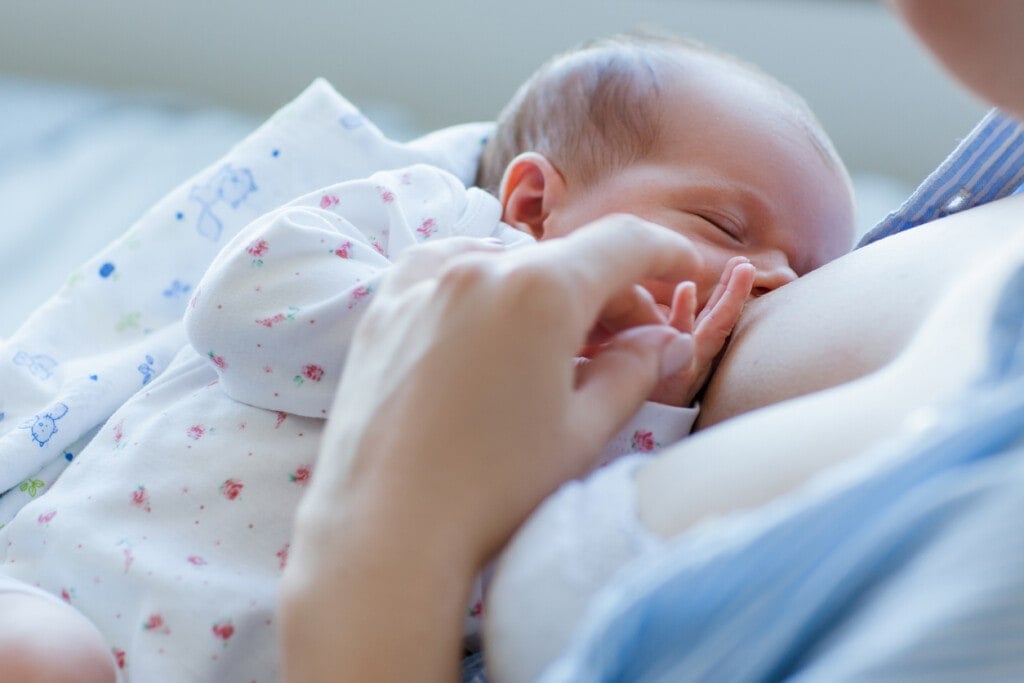As if pregnancy isn’t tumultuous enough for women, most moms will tell you that once that delivery glow has worn off, an entire wave of new problems hits. If you are amongst the lucky few who have given birth to a healthy baby, most of your conversations with hospital staff and doctors will now revolve around your baby’s feeding schedule and weight. Will my baby be okay? Will I be able to breastfeed? Is my baby getting enough? Will my baby grow? These are common questions that plague new moms.
The 411 on Newborn Weight Loss
Nearly all babies lose some weight shortly after birth. This is even more common for breastfed babies. It is normal for babies to lose up to 10% of their birth weight in the first week of life.1 This means that if your baby was 3kg at birth (or 6lbs 9oz lbs), it is normal for them to lose 300 grams (or 10.5 oz) in the first week of life. This is a natural occurrence since, while in the womb, your baby had regular meals delivered to him via his umbilical cord. After birth, he needs to figure out how to feed and eat while your body also has to figure out how to make milk, which can take several days. Combining these two factors leads to a natural and expected weight loss shortly after birth in most babies.
When Will My Baby Start Gaining Weight?
After the initial period of weight loss, babies should gain an average of 1 ounce daily. Pediatricians want babies to be back up to their birth weight by the time they are 2 weeks old.1 This is why babies are weighed several times in the hospital before discharge and the conversation continues at every check-up with your pediatrician. Whether babies grow well is a big testament to whether they are healthy. Excessive weight loss in a baby can be detrimental to their health.
Why Do Newborns Lose Weight?
Newborns can lose weight for various reasons, including not drinking or getting enough milk, having an incorrect latch, or being too sleepy from the marathon of entering the world! Occasionally, weight loss is also due to the onset of late milk production in a mother. Babies born via C-section tend to lose a bit more weight than those born vaginally because C-sections can delay breast milk production even further. Conversely, formula-fed babies don’t tend to lose much weight.
When Should I Raise Concerns?
If your baby is losing weight after one week of age, immediately bring this to your pediatrician’s attention. Your pediatrician will evaluate your baby’s latch and do a thorough physical exam to ensure nothing else is contributing to the weight loss. If a baby loses more than 10% of their birth weight, many pediatricians will keep an extra close eye on them to ensure there is no underlying reason for this weight loss.
How Can I Help My Newborn Gain Weight?
Here are some things you can do to help your baby transition well and gain weight in the first two weeks of life:
- Weigh your baby regularly at home. If you don’t have a baby scale, weigh yourself before holding your baby and after holding your baby, then subtract the difference. Be sure not to get discouraged by the number you see on the scale for yourself – you just had a baby, and it took 9 months for your body to get to this point! Your body is amazing. Give it time.
- Have ample skin-to-skin time. Skin-to-skin time promotes feeding and bonding and imparts immune support to your child. Moms who cannot breastfeed can pass on immunity by doing more skin-to-skin time.
- You can also weigh a baby before and after feeds to quantify the amount of breastmilk produced. All babies are different, but aim for at least 2 ounces per feed.
- Feed your baby often, at least every 2-3 hours around the clock in the newborn period.
- Increase your milk supply by pumping. You can consult your doctor or a lactation consultant for more tips on increasing your supply.
- Count your baby’s wet diapers and ensure they get at least 4-6 daily. One of the main concerns that come with babies losing excessive weight at birth is dehydration, which can be dangerous.
If your baby continues to lose weight, your pediatrician will assess the situation and give you personalized advice. Often, that advice may include supplementing, as continued weight loss can negatively impact a baby’s health for various reasons (one of which is that it can contribute to jaundice, a condition in which the baby’s skin turns yellow). In these situations, supplementation is typically temporary.
Remember, Newborn Weight Loss Is Normal
No matter what happens, remember that losing weight is a natural part of the newborn transition period, and it is normal for new parents to feel concerned about their baby’s well-being. Once this period passes, you will likely transition into a more relaxed feeding schedule, and things will fall into place. As parents, you are doing your best for your baby, which is all that matters.



































